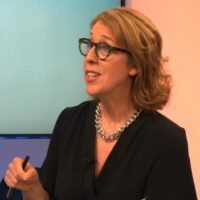
Diversity and Inclusivity Finance Forum (DIFF) keynote speaker Karl Lokko, chairman at venture capital and private equity community Black Seed, took the lunch audience on a white-knuckle ride through his early years as a former gang member, his rehabilitation and education and his work to drive financial inclusion and the empowerment of the black community.
Speaking on his early years in London growing up in an immigrant family, he reflected that seeing a gang shooter in action was one of his first visions of black strength at the age of 12 years old.
He said: “You know, I actually was besotted with him for a moment. I saw him wield a level of audacity, of power, which was just opposite to the theme of the area and the context I was coming from. It was a whole theme of powerlessness. And here I am witnessing this guy. Even though it was brutality, it felt like an antidote to that powerlessness.”
He knew he couldn’t beat the gang culture, nor had the clout to join them, so he and his associates drew ‘awkwardly’ together in a bid to counterbalance the limbo they felt they occupied by creating their own gang. “We felt a bit more secure. Had a bit more self-esteem,” he said.
Years later, intervention eventually came in the shape of London’s ‘Mother Theresa’. This lady’s son was Lokko’s right-hand man in the gang and she thought the best way to subvert the limitations of the mother-son dynamic was to reach out to his friend.
“And I was fortunate enough to be that friend, you know, so I ended up moving in with them actually, and then the home became an informal therapeutic gang rehabilitation centre. She just gave her all. She bit off more than she could chew, and she chewed it anyway, you know. It was conversation. It was mainly dialogue. It was very beautiful,” said Lokko.
Learning to progress
Lokko returned to his first love, education, finally making it to study a degree at Queen Mary University of London. He decided to launch one of the first few community gang rehabilitation centres but realised quickly that his lack of a network held him back.
“I understood from a street level, that relationships were a catalyst, whenever anyone wants to bring anything into fruition. You know, so I knew that I needed to bring together a cast that could help me incubate this idea and bring it to life. So I went to Google search engine, and searched for the most money and clout in the country. I mean, the biggest PR people in the country, I mean politicians and whatever names were generated, I emailed their PAs, or got past their PAs.”
He added: “I have a lot of audacity but I didn’t have anything to lose, you know. It was necessary that this exists. So, at this point, you know, like the rest of the world when the mission is greater than the threat, you move forward. They all began to champion me. Through those 12 people who all came to sit around a dinner table together, looking at each other realizing I was the common denominator, I could get an introduction to anyone on earth. That very dark, black book enabled me to have social mobility,” said Lokko.
Special adviser to Prince Harry and consultant to KPMG
Lokko said he’s had invites to every royal wedding in the last decade and met George Clooney. He has reached a point where he can make initiatives happen, including his venture capital company. But he said financial services presented him with a whole new challenge, as one of the most exclusionary industries he’d encountered.
“I had been campaigning and advocating for a fairer and more inclusive business ecosystem for about a decade, you know. I did that through different iterations, different hats: Special adviser to Prince Harry for several years, a philanthropic advisor to the Branson family, raised more than £10m for charity and was a consultant to the Big Four, namely KPMG and nothing was happening. I could wax lyrical, preach loud, shout from the hilltops that change needs to happen. But the grooves of it were so deep, all the endorsements in the moment didn’t matter. It was going to take a lot more of a collective effort to actually move things through,” said Lokko.
The pinnacle of his frustration over the lack of progress came during the first Covid lockdown. But, he said it was also a good time to get hold of ‘hard to get to’ people because everyone was bored at home.
Research from not-for-profit community interest group Extend Ventures shows that over the decade to 2020, just 0.24 per cent of the total venture capital seed funding had been allocated to a black founder, with just 0.02 per cent to a black female founder.
This is a good example of the fact that being black or disadvantaged is not a single, unifying thing, said Lokko. “Experience comes in different shapes and forms. It could be a perspective drawing from one’s religious orientation, sexual orientation, pigmentation. It could be down to the region a person is from – intersectionality (or the multiple disadvantages that compound to create obstacles conventional thinking may not see) is important to understand,” he said.
The hidden alumni
Capitalism appears to be the best human invention we’ve come up with so far to move things along for society, he reflected, but we have to understand that it is serving some more than others and that isn’t fair. Equal opportunity doesn’t exist, he said, so even his £10m Black Seed fund can only shift the allocation to black founders dial from 0.24 to 0.38 per cent.
Life for some is like scaling the ‘north face of the mountain’ – which in the Northern Hemisphere, is the coldest, iciest, most formidable route to the top.
Lokko said he has long been ‘screaming’ to raise the profile of the ‘hidden alumni’, those who have had to scale the north face of the mountain to achieve what is perceptibly the same thing but via a far harder route. I can’t agree that a first achieved by someone advantaged from a prestigious university is worth more than a 2:1 from a person from a disadvantaged background at a lesser university, said Lokko.
“I will challenge you on that. I would say that maybe although they came from Lambeth, which has the highest teenage pregnancy rate in Europe at one time and got pregnant at the age of 15 or 16. Maybe they did their GCSEs you know, in the state of pregnancy. They pulled themselves up, you know and then had to do that as a single mother and to emerge out of the other end with a 2:1, I’m gonna say that person’s 2:1 is worth more than that first and that is context, context context.”
He added: “That person has had to climb and scale in certain ways, develop particular muscles that the rest of the world doesn’t even know exist, because they never needed them.”
The Diversity and Inclusivity Finance Forum (DIFF) annual lunch was held at One Moorgate Place in the heart of the City in front of a depleted (train strikes) but triumphant audience of DIFF members who gathered to mark the year’s event programme.
DIFF aims to make everyone regardless of race, ethnicity, gender or sexual orientation, feel supported within the business community and consumer sphere.
Thanks again to the other thought-provoking speakers on the panel, titled: What’s DIFF ever done for me? including Dina Bhudia, director, P2M Asset Management, Amanda Bryden, head of Halifax Intermediaries and Scottish Widows Bank and Stephanie Charman, strategic relationships director, Sesame Bankhall Group.
The next DIFF event titled: “Woke”, cancel culture and privilege, will run on 15 June at Ironmonger’s Hall for the Leadership tier and the 20th June at One Moorgate Place for the Executive tier.

















